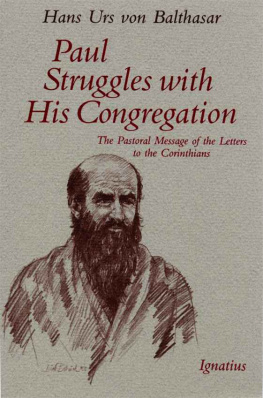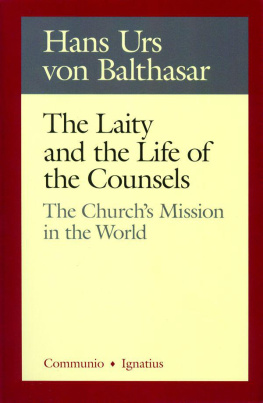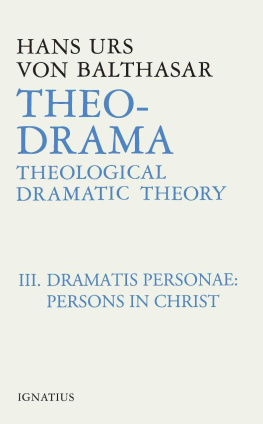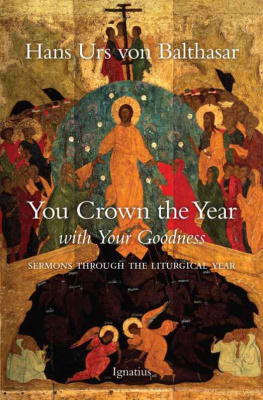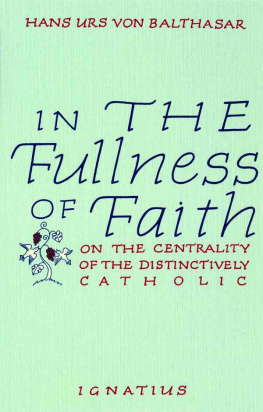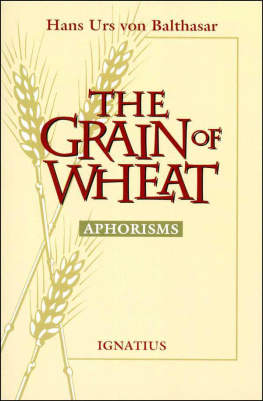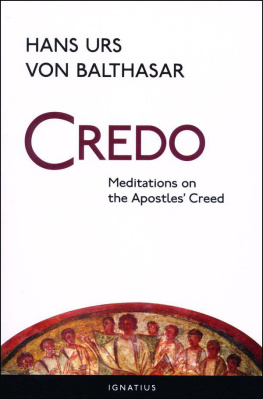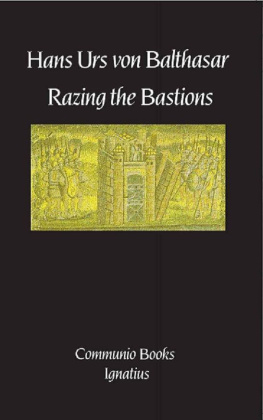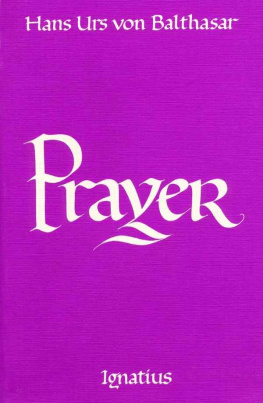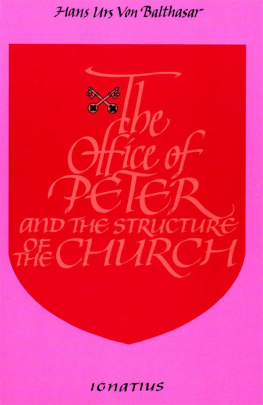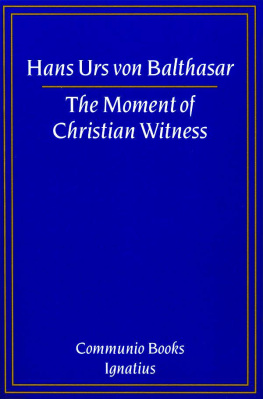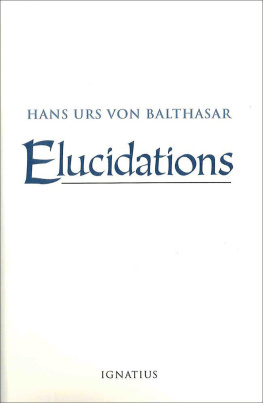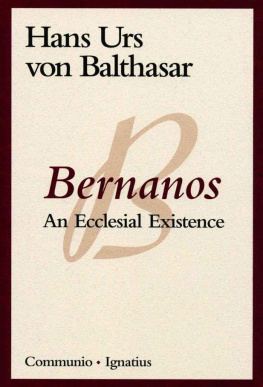PAUL STRUGGLES WITH HIS CONGREGATION
HANS URS VON BALTHASAR
PAUL STRUGGLES
WITH HIS
CONGREGATION
The Pastoral Message of the Letters
to the Corinthians
TRANSLATED BY
BRIGITTE L. BOJARSKA
IGNATIUS PRESS SAN FRANCISCO
Title of the German original:
Paulus ringt mit seiner Gemeinde
1988 Johannes Verlag, Einsiedeln-Trier
Cover art: 1991 Dick Bobnick
Cover design by Roxanne Mei Lum
1992 Ignatius Press, San Francisco
All rights reserved
ISBN 978-0-89870-386-3
Library of Congress catalogue number 91-76068
Printed in the United States of America
CONTENTS
I
II
III
IV
V
INTRODUCTION
The questions people ask God and the Church change; Gods answer in Christ is sufficient for all time. Even though the Church, as well as the individual priest, always has to make this answer understandable anew, its essence does not change. Pauls dramatic confrontation with the congregation of Corinth proves both: his words and actions do complete justice to the situation and yet they are timeless. Therefore his pastoral directives to this difficult congregation are still a guideline for everyone holding a Christian office.
The little sketch presented here confines itself to the Letters to the Corinthians, although parts of Galatians, Colossians, and Hebrews could have been offered to supplement the pastoral directives. The eye-to-eye confrontation with Corinth is so intense and so rich, that it includes virtually everything of importance.
We are concentrating solely on the pastoral question, thus neither a dogmatically exhaustive nor exegetically satisfying interpretation is being offered. Every expert knows how many places there are in the text where a definitive interpretation remains controversial (why should the woman wear a sign of authority on her head during the service because of the angels? [1 Cor 11:10]; should the slave strive to be free or should he rather remain in his present state? [1 Cor 7:21]), We shall not take up such questions. Nor would it greatly profit pastoral understanding to research exactly what questions the Corinthians asked Paul, which he answers in the First Letter (certainly chapters 7, 8-10, 12-14) and with what instructions and reprimands he responded to what was reported to him directly or in writing (certainly chapters 5 and 6, probably 11 as well, and surely 15).
There are several other very complicated questions that we are just as little concerned with: What took place bio graphically between the first and the second letters? Is either one, but especially the second, composed of several parts, and if so, where are they joined? Without going into the reasons, we want to agree with the opinion that the sequence of events was as follows. The first surviving letter (which there is no sufficient reason to divide up) was preceded by a lost, earlier letter. After this earlier letter there was a visit to Corinth which went badly, following which Paul, who had returned to Ephesus, wrote the letter with many tears (2 Cor 2:4) and dispatched Titus to Corinth. When Titus finally brought him back good news (2 Cor 7:6), he sent the second surviving letter, announcing his own arrival. This letter of reconciliation seems to consist of chapters 1 to 7 (6:14 to 7:1 is certainly a copyists interpolation), while chapters 8-9 about the collection for Jerusalem (presumably two different pieces of writing) do not necessarily belong to the letter of reconciliation. Chapters 10-13, in which he settles accounts with the enemies, are quite different in character and presumably are a part of the letter with many tears. They are extremely important for us. We will not go into the chapters about the collection in detail. We take the letters as they are presented, as inspired texts of the New Testament.
The pastoral, rather than dogmatic, orientation of this little book unfortunately does not allow us to unfold the inexhaustible theological depth of the letters, or even of the themes touched upon; these could be far more richly orchestrated by quotations from the other letters. For the theology, we must direct the reader to the numerous commentaries.
I
THE FOUNDATIONS OF THE
TEACHING
Paul presents his doctrine to the congregation with power and absolute clarityagainst their inclinations. Its central theme is Cross and Resurrection , found in the First Letters opening and second-to-last chapters. This gospel is veiled (2 Cor 4:3) and is an aroma from death to death (2 Cor 2:16) only to one who has been blinded by the god of this world (2 Cor 4:4). But for those claiming to be spiritual (1 Cor 2:13), whether they want to hear it or not, the word of the Cross (the principle of the Cross, 1 Cor 1:18), contains the basis for all that follows, including the solution to all the congregations problems. With full force he impresses on them that Gods seeming foolishness in allowing his Son to be crucified and in the absurdity of the preaching of the gospel (1 Cor 1:18; 1:21ff) flies in the face of all human wisdom; the rulers of this age (Caiaphas and Pilate) could not understand it (1 Cor 2:8ff.).
One has to see Pauls message of the Cross in its fullness; it tells us that Christ who knew no sin was made to be sin on our behalf (2 Cor 5:21); this event springs solely out of the love of Christ (2 Cor 5:14) and this, in turn, out of the love of God the Father, who was in Christ reconciling the world to himself, not reckoning their trespasses against them (2 Cor 5:18ff.). Gods will to forgive and the atonement Christ achieved form such a unity that, for Paul, there can be no talk of Christs Cross being a punishment. Paul focuses first and foremost on the implications: by means of the Cross, we (mankind) have attained righteousness and sanctification, and redemption (1 Cor 1:30), yes, even the righteousness of God (2 Cor 5:21), and that inwardlywe have become temples of God (1 Cor 3:16) and of his Holy Spirit (1 Cor 6:19)which means we owe absolutely everything to his loving grace (1 Cor 4:7). Through the bloody sacrifice of the Cross and the form it takes in the Church as baptism and Eucharist (sharing in the blood of Christ [1 Cor 10:16]) we are actually incorporated into the holiness of Christ. The entire doctrine of the Body of Christ, of which we are individually members (1 Cor 12:27), issues directly from the event of the Cross. Undoubtedly, it stands at the center of world history; everything that came before served as examples (1 Cor 10:6), all that follows is proclamation and unfolding. But the whole structure of the Church is also determined by the Cross. Its functionas we must demonstrateis to participate in Gods work in the world. Since God has committed to us the word of reconciliation (2 Cor 5:19), (a result of the Cross), this function is nothing other than the ministry of reconciliation (2 Cor 5:18), and therefore it has its special share in what took place at the Cross. But so does the congregation as a whole and each individual member of it: as they behold the Lord, all of them are to be more and more transformed into his likeness.
Jesus Cross would remain meaningless without the Resurrection . This is in no way a spiritual resurrection, such as the Corinthian charismatics fancied had already happened to them; rather, it is precisely that to which the historical witnessesCephas, the twelve, more than five hundred brethren, James, all the apostles, and lastly Paul (1 Cor 15:5ff.)testified, after Jesus had been three days in the grave. Something differentjust an immortal soul, reincarnation and the likeis quite foreign to Paul. Christs Resurrection is the point of the whole gospel: without it our entire faith is worthless (1 Cor 15:17), our dead have perished (1 Cor 15:18), anddemonstrating the unbreakable connection between Cross and Resurrectionyou are still in your sins (1 Cor 15:17). Otherwise, like the prophets, our choice could be: Let us eat and drink, for tomorrow we die (1 Cor 15:32; Is 22:13). It is extremely significant for Paul that there is a resurrection of the body, not at all because, based on the Old Testament, he can conceive of man only as a spirit within a body, but because Christs truly human and crucified body is decisively important for his whole doctrine of salvation. That the resurrected body is and will be a spiritual one, spiritually life-giving (1 Cor 15:45), and that therefore a corruptible one cannot share in Gods Kingdom of heaven, does not preclude Gods already having given us the Spirit in our hearts as a pledge (2 Cor 1:22), as those incorporated in the risen Christ. Of course the Spirit is not given the way those so-called spiritual men of Corinth imagine, for the spiritual is not first but the natural, the corruptible; it is only after that, that we are completely conformed to the man from heaven, Christ (1 Cor 15:46ff.). That is why Paul describes our present life by faith not by sight as one not yet at home, lived absent from the Lord (2 Cor 5:6-7, 9), a life that longs to be at home with the Lord; but in the end his preference for leaving his mortal body in order to be clothed with a heavenly one yields to his willingness to live as God pleases. Paul never reflects upon the condition between death and resurrection (not even in the passage 2 Cor 6:1-10).
Next page
